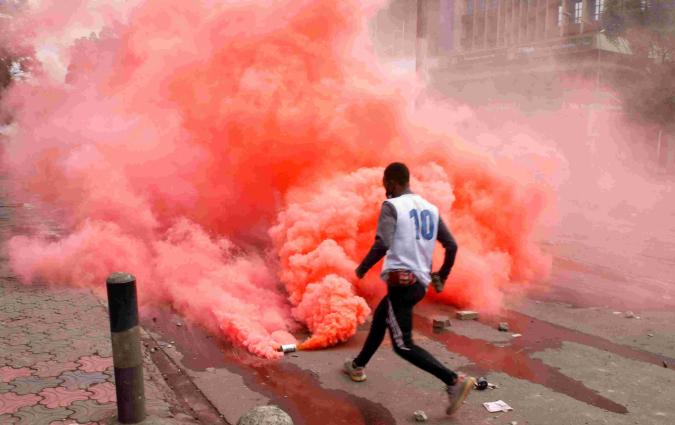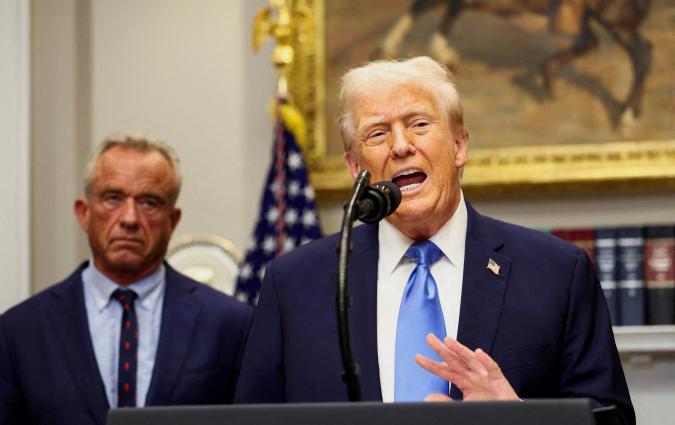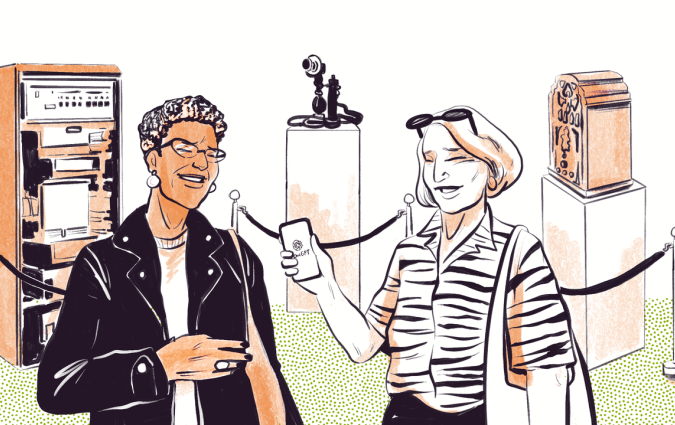“You can’t blame platforms alone, but in a country with the right conditions they can undermine democracy and public debate”

Patrícia Campos Mello.
As a foreign correspondent, Patrícia Campos Mello (1975) has reported from over 50 countries on ethnic violence, health issues and human rights. In 2018 she published an investigative series showing how Jair Bolsonaro's supporters had paid companies to automatically send millions of messages through WhatsApp during the presidential campaign.
This series was the origin of her book A máquina do ódio and resulted in several ongoing investigations and regulatory changes. It was also the start of a relentless harassment campaign instigated by the Brazilian President and his allies. In May 2020 Patrícia sued Bolsonaro's son in a civil court for falsely claiming she had used sex to gain damning information about his father. She was awarded 30,000 reais ($5,500) in damages. The court's decision may be appealed.
Patrícia gave the 2021 Reuters Memorial Lecture, the most important event hosted every year by the Reuters Institute. We spoke before the event about her career, the future of social media, online harassment and being a journalist in Bolsonaro's Brazil. Our conversation has been lightly edited for brevity and clarity.
Q. Why did you become a journalist in the first place?
A. I always wanted to be a journalist. I tried law school for a year and then I gave up. Since I was a child, I was interested in listening to other people’s stories and getting to know their lives.
Q. You’ve been a foreign correspondent for a long time. In which ways did that job prepare you to cover what’s happening in Brazil right now?
A. As a foreign correspondent it’s important to be humble. You must put yourselves in other people’s shoes and be aware that we’re only going to have a restricted view of other people’s culture. It’s important to understand that we do have a bias and that we are privileged. Whenever we cover conflicts, it’s because we wanted to be there. We can go back to our homes to our warm beds.
We go to another country that is living through an outbreak, a crisis, a conflict, and the real victims are the people who live there. They don’t have the option of leaving. So covering the rise of an authoritarian government here in Brazil is very different. Even though this is not a real conflict, we are living through a war against journalism, and journalists are the targets right now.
Q. Do you think the Brazilian press adapted well to the change you describe?
A. Since the end of the military dictatorship in the 80s, we had not faced any kind of intimidation. Just the normal animosity between governments and the news media. So at first we were all a bit shocked. Then we reacted, and the Brazilian media should be very proud because they did adapt. Most journalists are not self-censoring. They’re keeping their independence and doing an excellent job in not getting intimidated.
Q. Did you or your colleagues foresee the things Bolsonaro would do in office?
A. As with Trump, we were under the illusion that Bolsonaro would be a normal President. That he wouldn’t still be saying these outrageous things and introducing outrageous bills. And then he did everything he said he was going to do. So I guess we were in denial.
This is a global phenomenon – authoritarians who use democratic institutions to erode democracy. Many of us were still thinking with the old mentality, assuming any authoritarian leader would take power through a classic coup d’état. Then, all of a sudden, we realised that you can have an authoritarian government even though it was democratically elected. It happened in Venezuela, and lately in the US and the Philippines.
Q. You’ve investigated the role of WhatsApp and other platforms in this new authoritarianism. Do you think what’s happened in Brazil would have been possible at all, or perhaps would have been different, without the accelerator provided by technology platforms and the role they play?
A. You can’t blame platforms alone. You had a perfect storm here in Brazil with the same party in power for 12 years and several corruption scandals. But the use of WhatsApp and other internet platforms amplifies whatever a political group says in an exponential way. So I don’t think platforms by themselves can do this. But if you find the right conditions in a country, they are really dangerous tools to undermine democracy and manipulate public debate. And it took a while, but the platforms did realise they were causing a huge problem – and they started taking measures to mitigate this.
Q. WhatsApp has now restricted the bulk sending of messages, which is one of the things that you investigated. So I’m curious if things have changed in Brazil after that.
A. When I first started writing about disinformation in Brazil in 2018, platforms were very dismissive. Whenever you contacted them pointing to the automated systems used to send bulk messages, they said: “Oh no! It’s all organic.” Then came two defining episodes fueled by disinformation campaigns: the lynchings in India and the 2018 elections in Brazil. That’s when they realised they had a huge public relations problem and their behaviour changed.
So first they said, “No, there’s nothing wrong.” Then, one year later, they admitted that WhatsApp was being used in a massive way to influence elections. They started suing marketing agencies that were misusing the platform and banned mass messaging.
It took a while for WhatsApp to acknowledge there was a problem, but they did and they’re trying to fix it.At the same time, people are migrating to less regulated platforms like Telegram, so it’s an ongoing struggle.
Q. Do you think platforms were too much focused on the US and didn’t pay attention to the way their products were being misused in countries like India or Brazil?
A. Definitely. What happens in the US is very visible and there’s a huge difference in the way they enforce their rules in the US and Europe and the way they do it in the rest of the world.
Recently we did a story showing that even though President Bolsonaro has violated COVID-19 community rules on Facebook over 25 times in two months, there was no labelling or links to more information on his videos while they were acting on Trump for this. So I think there are different standards as to what kind of moderation policies they are going to enforce, and how concerned they’re going to be about the misuse of their tools, depending on how important the country is perceived to be.
Q. Do you think COVID-19 has changed that calculus in the sense that tech platforms are a bit more proactive because there’s a clear health risk in some of the statements from politicians?
A. Absolutely. Disinformation related to COVID-19 literally kills so they realised they would have blood on their hands if they didn’t do anything to prevent this from spreading. However, I do think in the beginning they had this perception that this was public health and not political. But in several countries, public health and politics are so mixed that when enforcing their public health rules, platforms get into political issues.
Q. You’ve suffered a brutal harassment campaign from the President’s supporters. How did you deal with this experience?
A. Online harassment is a widespread problem that disproportionately affects women, and especially women of colour. I had never been through anything like that. I have been a professional journalist for ever and I had never been personally targeted with this kind of campaign. It’s very personal. We tend to think that this is something that stays online, and it does not. It’s increasingly mixed with real life and many online threats I received migrated to the real world.
I had people yelling at me, calling my phone number saying, “I’m going to punch you in the face” or people actually doxing me, telling people to go to places where I was going to confront me. I’ve had threats against my son. And then, of course, the whole sexual thing that’s often used to delegitimise women journalists around the world, saying “if you are a woman and a journalist, of course you are offering sex to get information.” Or saying, “you’re ugly, you’re fat, you’re old.” Or anything that doesn’t have anything to do with our work.
I’m far from being the only one in Brazil who’s going through this. This is a daily thing here now. Sometimes it’s a male journalist. But women are often the ones being targeted and threatened.
This was difficult in the beginning. We’re not used to being the target. We’re not used to being news. As journalists we are trained to check our sources and speak to everyone involved on an issue. I never had to consider what was going to happen if I published this or how I would protect our family or how I would protect my mental health. Now it is something that I have to take into consideration before publishing investigative pieces.
Q. What would be your advice to others going through the same nightmare?
A. We have a proverb here in Brazil saying, “don’t clap to crazy people when they dance.” So basically do not answer. Do not feed the trolls. That’s probably going to embolden them and that’s what they want.
Every time any false information circulates, I just publish the correct information with evidence. In my case audio recordings, messages, everything that proves this was a lie. Then I do not engage in online fights or discussions. If there is something really serious, I just call the police. If it’s just online attacks, do not engage. I don’t. If you do that, you’re just feeding these people and giving them what they want.
It’s also healthy if you can have a friend or a family member that can read through all the hate messages just to check if there’s something dangerous that needs to be reported to the police. But you should stop reading everything or seeing everything when you’re in the middle of an attack. It’s toxic and makes you feel gradually depressed.
Q. Last year you sued Jail Bolsonaro’s son and won. I wonder if you can share why you did and whether you feel this kind of route may be an answer, at least in some cases.
A. I had never thought of suing anyone – much less the President or his son. I didn’t want to get into anything like that. But we decided to sue them after we published all the evidence showing that their harassment campaign was based on lies. That did not stop them, and you had like these political figures going on live TV and online, just telling these lies to millions of people.
So once this wouldn’t stop, the reasoning was that if we didn’t do anything it would seem that it was normal and that they could do anything.
We thought that it was important to sue them for damages to show that this is not acceptable. Just because you were elected to public office, you can’t just slander female journalists as an intimidation strategy.
They can appeal the ruling. But the fact that we won is a relief in a way because it means there’s still some independence in the judiciary, even though that’s decreasing. It’s a good sign for all female journalists who have been targeted, and I know not everyone can do what I did. I have an employer and it’s their lawyer that is defending me. I’m aware this is not an option for everyone. But I’m also the director of the Investigative Journalist’s Association here in Brazil, and we have an agreement with the Brazilian Lawyer’s Organisation to have pro bono lawyers working for us. So it is important not to leave these people thinking that just because they are politicians it is acceptable to intimidate the press.







